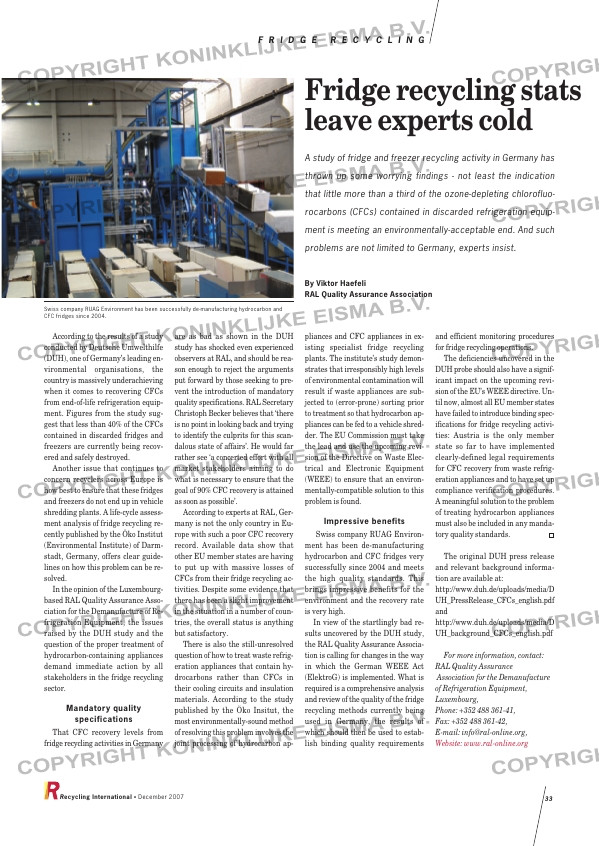Page 33 from: December 2007

According to the results of a study
conducted by Deutsche Umwelthilfe
(DUH), one of Germany’s leading en-
vironmental organisations, the
country is massively underachieving
when it comes to recovering CFCs
from end-of-life refrigeration equip-
ment. Figures from the study sug-
gest that less than 40% of the CFCs
contained in discarded fridges and
freezers are currently being recov-
ered and safely destroyed.
Another issue that continues to
concern recyclers across Europe is
how best to ensure that these fridges
and freezers do not end up in vehicle
shredding plants. A life-cycle assess-
ment analysis of fridge recycling re-
cently published by the Öko Institut
(Environmental Institute) of Darm-
stadt, Germany, offers clear guide-
lines on how this problem can be re-
solved.
In the opinion of the Luxembourg-
based RAL Quality Assurance Asso-
ciation for the Demanufacture of Re-
frigeration Equipment, the issues
raised by the DUH study and the
question of the proper treatment of
hydrocarbon-containing appliances
demand immediate action by all
stakeholders in the fridge recycling
sector.
Mandatory quality
specifications
That CFC recovery levels from
fridge recycling activities in Germany
are as bad as shown in the DUH
study has shocked even experienced
observers at RAL, and should be rea-
son enough to reject the arguments
put forward by those seeking to pre-
vent the introduction of mandatory
quality specifications. RAL Secretary
Christoph Becker believes that ‘there
is no point in looking back and trying
to identify the culprits for this scan-
dalous state of affairs’. He would far
rather see ‘a concerted effort with all
market stakeholders aiming to do
what is necessary to ensure that the
goal of 90% CFC recovery is attained
as soon as possible’.
According to experts at RAL, Ger-
many is not the only country in Eu-
rope with such a poor CFC recovery
record. Available data show that
other EU member states are having
to put up with massive losses of
CFCs from their fridge recycling ac-
tivities. Despite some evidence that
there has been a slight improvement
in the situation in a number of coun-
tries, the overall status is anything
but satisfactory.
There is also the still-unresolved
question of how to treat waste refrig-
eration appliances that contain hy-
drocarbons rather than CFCs in
their cooling circuits and insulation
materials. According to the study
published by the Öko Insitut, the
most environmentally-sound method
of resolving this problem involves the
joint processing of hydrocarbon ap-
pliances and CFC appliances in ex-
isting specialist fridge recycling
plants. The institute’s study demon-
strates that irresponsibly high levels
of environmental contamination will
result if waste appliances are sub-
jected to (error-prone) sorting prior
to treatment so that hydrocarbon ap-
pliances can be fed to a vehicle shred-
der. The EU Commission must take
the lead and use the upcoming revi-
sion of the Directive on Waste Elec-
trical and Electronic Equipment
(WEEE) to ensure that an environ-
mentally-compatible solution to this
problem is found.
Impressive benefits
Swiss company RUAG Environ-
ment has been de-manufacturing
hydrocarbon and CFC fridges very
successfully since 2004 and meets
the high quality standards. This
brings impressive benefits for the
environment and the recovery rate
is very high.
In view of the startlingly bad re-
sults uncovered by the DUH study,
the RAL Quality Assurance Associa-
tion is calling for changes in the way
in which the German WEEE Act
(ElektroG) is implemented. What is
required is a comprehensive analysis
and review of the quality of the fridge
recycling methods currently being
used in Germany, the results of
which should then be used to estab-
lish binding quality requirements
and efficient monitoring procedures
for fridge recycling operations.
The deficiencies uncovered in the
DUH probe should also have a signif-
icant impact on the upcoming revi-
sion of the EU’s WEEE directive. Un-
til now, almost all EU member states
have failed to introduce binding spec-
ifications for fridge recycling activi-
ties: Austria is the only member
state so far to have implemented
clearly-defined legal requirements
for CFC recovery from waste refrig-
eration appliances and to have set up
compliance verification procedures.
A meaningful solution to the problem
of treating hydrocarbon appliances
must also be included in any manda-
tory quality standards.
The original DUH press release
and relevant background informa-
tion are available at:
https://www.duh.de/uploads/media/D
UH_PressRelease_CFCs_english.pdf
and
https://www.duh.de/uploads/media/D
UH_background_CFCs_english.pdf
For more information, contact:
RAL Quality Assurance
Association for the Demanufacture
of Refrigeration Equipment,
Luxembourg,
Phone: +352 488 361-41,
Fax: +352 488 361-42,
E-mail: [email protected],
Website: www.ral-online.org
F R I D G E R E C Y C L I N G
Recycling International • December 2007 33
Fridge recycling stats
leave experts cold
A study of fridge and freezer recycling activity in Germany has
thrown up some worrying findings – not least the indication
that little more than a third of the ozone-depleting chlorofluo-
rocarbons (CFCs) contained in discarded refrigeration equip-
ment is meeting an environmentally-acceptable end. And such
problems are not limited to Germany, experts insist.
By Viktor Haefeli
RAL Quality Assurance Association
Swiss company RUAG Environment has been successfully de-manufacturing hydrocarbon and
CFC fridges since 2004.
RI_021 Fridge RI:Opmaak 1 06-12-2007 14:41 Pagina 33



